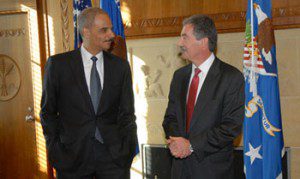28 May 2013 | Americas

Attorney General Eric Holder and Deputy Attorney General James Coles are under fire for a subpeona of Associated Press telephone records. (Photo: DOJ)
A group of organisations sent a letter on 24 May to US Attorney General Eric Holder demanding a full and transparent report on the Department of Justice’s secret investigations into journalists and whistleblowers.
Craig Aaron, president of Free Press, called the Justice Department’s actions “appalling”.
“This is not just a matter of concern for journalists or newsrooms; it’s an issue at the heart of our democracy”, Aaron said in a statement.
The issue unfolded as the Justice Department sought out the source of government leaks by seizing phone records from Associated Press reporters. The records were obatined through a secret subpeona, which did not give the AP the normal right to repsond to the request. The records included office and personal lines for the reporters. The Justice Department has yet to officially inform the AP why it had sought the records.
The full text of the letter:
May 24, 2013
Attorney General Eric Holder
Deputy Attorney General James M. Cole
U.S. Department of Justice
950 Pennsylvania Ave.
Washington, D.C. 20530
Dear Sirs:
More than 50 journalism and press organizations recently wrote you to voice grave concerns about the Justice Department’s subpoena of telephone records belonging to Associated Press reporters and editors. We write today as a coalition of civil rights, public interest, transparency and media reform groups to express similar concerns.
Your actions have threatened press freedom — and endangered the health of our democracy. As groups working to strengthen democratic institutions and foster more open government, we are deeply concerned that your agency’s actions will hinder efforts to make government more transparent and accountable to the public.
Following years of aggressive leak investigations, the Justice Department’s overreaching subpoena of AP phone records sets a dangerous precedent. Furthermore, it appears to violate the Department’s own rules and guidelines. The impact of the Justice Department’s actions is already being felt. AP CEO Gary Pruitt reports that sources are now less willing to talk to reporters. And journalists from newsrooms large and small have noted the chilling effects on their coverage of the government.
The latest news suggests that the subpoenas were even broader than initially reported. In addition, details are emerging about a case in which the Justice Department also seized phone records from reporters at Fox News and labeled one of its journalists a “co-conspirator” for simply doing his job.
These troubling developments raise real questions about the scope of the Department’s surveillance of journalists. At a recent congressional hearing, Mr. Holder, you couldn’t recall how many times the Justice Department has subpoenaed journalists’ records. We need to know the full extent of your Department’s crackdown against journalists.
In the digital age, reporting is no longer confined to America’s traditional newsrooms. As such, threats to press freedom threaten anyone who seeks to share information about official actions using a cellphone, social media service or website. The Obama administration promised a new era of openness and transparency. Your actions, which expand secrecy and intimidate those trying to shed more light on our government, run counter to that promise.
We demand a full accounting of the Justice Department’s targeting of journalists and whistleblowers. We need this information so that we can advocate for appropriate action to protect everyone’s constitutional rights and push for stronger legal standards to protect all types of information gathering and sharing.
The Justice Department must explain its overreach in this matter. Furthermore, we call on the Department to stop violating its existing rules and cease targeting of individuals and organizations reporting on government activity.
Sincerely,
ACCESS
Alliance for Women in Media
American Booksellers Foundation for Free Expression
American Civil Liberties Union
American Library Association
The Banyan Project
Brave New Films
Center for Democracy and Technology
ColorOfChange.org
The Committee to Protect Journalists
Common Cause
Communications Workers of America
CREDO Action
CultureStrike
Defending Dissent Foundation
Digital Media Law Project
Electronic Frontier Foundation
Fairness & Accuracy In Reporting
Freedom of the Press Foundation
Georgia First Amendment Foundation
IndyMedia
Investigative News Network
iSolon.org
Katy’s Exposure Blog
Knowledge Ecology International
LAMP: Learning About Multimedia Project
Media Alliance
The Media Consortium
Media Mobilizing Project
Mine Safety and Health News
MuckRock
National Alliance for Media Arts and Culture
National Association of Black Journalists
National Coalition Against Censorship
National Federation of Community Broadcasters
National Freedom of Information Coalition
National Hispanic Media Coalition
National Priorities Project
Native Public Media
The Newspaper Guild-CWA
OpenTheGovernment.org
Park Center for Independent Media
Participatory Politics Foundation
PEN American Center
Personal Democracy Media
Project Censored
Project On Government Oversight
Prometheus Radio Project
Public Record Media
RootsAction.org
Society of Professional Journalists
Sunlight Foundation
Tully Center for Free Speech at Syracuse University
United Republic
TheUptake.org
Utah Foundation for Open Government
Washington Civil Rights Council
Women In Media & News
Women, Action & the Media
Women’s Media Center
WRFN, Radio Free Nashville
Writers Guild of America, East
28 May 2013 | In the News
AUSTRALIA
Photographers withdraw from Vivid over censorship claims
Two international photographers have withdrawn their works from an exhibition in Sydney in protest over what one has described as censorship. (ABC News)
AZERBAIJAN
In Azerbaijan, authorities use ‘Harlem Shake’ to silence activist
The recent arrest of Ilkin Rustamzadeh highlights how Azerbaijan’s authorities use trumped up charges to silence messages they are not comfortable with, blogger Ali Novruzov writes from Baku. (Index on Censorship)
CHINA
´Ai Weiwei´s work embodies freedom of speech´
The popularity of Chinese artist and activist Ai Weiwei in the Netherlands is largely fueled by the Dutch love of art that hovers on the edge of acceptability. This commitment to pushing the boundaries of freedom of expression is evident in the exhibition FUCK OFF 2 which he’s curated and which opens at the Groninger Museum on Sunday. (Radio Netherlands Worldwide)
ISRAEL
Al-Jazeera draws fire over self-censorship
The Qatar-based al-Jazeera network has been criticized over its decision to remove a controversial article posted on its website amid claims the story was “anti-Jewish” in a seemingly self-censoring act. (YNet.com)
RUSSIA
Interpol Rebuffs Russia in Its Hunt for a Kremlin Critic
Interpol has rejected a Russian request for a worldwide police hunt for William F. Browder, a British investment banker and a Kremlin nemesis who has made no secret of his whereabouts or of his battle against the government of President Vladimir V. Putin over accusations of human rights abuses. (New York Times)
Russia: Gay Rights Activists Arrested At Rally
Dozens of activists at a gay pride march in Moscow have been arrested by Russian police. (Sky News)
TUNISIA
Tunisia’s ‘topless feminist’ faces jail for having pepper spray
The lawyer of a Tunisian woman who gained notoriety for posting online topless pictures of herself as a protest says she faces six months in prison for carrying a dangerous object. (AP via CBS47)
TURKEY
Turkey Kissing Protest Held In Subway As Couples Defy Ban On Public Displays Of Affection
Dozens of couples have locked lips at a subway stop in Turkey’s capital, Ankara, to protest subway authorities’ admonishment of a couple that kissed in public. (AP via Huffington Post)
Turkey takes important steps to end human rights violations
Turkish Deputy Prime Minister Besir Atalay said on Thursday that Turkey has made significant improvements in human rights, especially in freedom of expression. (Turkish Weekly)
UNITED KINGDOM
Speaker’s wife faces £150,000 bill for online libel
SPEAKER’S wife Sally Bercow faces a legal bill of £150,000 after losing a libel battle with Lord McAlpine yesterday over a tweet which falsely linked him to allegations of sex abuse. (The Daily Express)
Could “snooper’s charter” stop terror attacks?
Some UK politicians have said the murder of a soldier in Woolwich, London this week demonstrates the need for greater surveillance of communications data. But would a “snooper’s charter” really have made a difference? Index asked Emma Carr of Big Brother Watch and Jamie Bartlett of Demos for their views. (Index on Censorship)
UNITED STATES
Microsoft Disables Comments For Xbox One Videos Following Harsh Criticisms
Want to let Microsoft know how you feel about the Xbox One? You won’t be able to do it on the official YouTube videos. If you head to Microsoft’s official channel for the Xbox One, the comments for the videos have been aptly disabled. (Gaming Blend)
Attacks on the press should come as no surprise
Freedom of the press. It’s a bedrock of our Constitution, right there in the very first amendment. That means it’s one of the most important freedoms and rights guaranteed to this country, freedom of religion, freedom of speech, and freedom of the press, all interlocked and interdependent. (Marietta Times)
As UN’s Censorship Alliance Lashes Out from Anonymity, UN Does Nothing
UN scribes from Reuters, Bloomberg News, Voice of America, Agence France Presse and others on the board of the UN Correspondents Association tried to get Inner City Press thrown out of the UN in 2012. In 2013 they have started anonymous social media accounts to falsely accuse Inner City Press of being funded by terrorists.
(Inner City Press)
24 May 2013 | News and features, United Kingdom
Some UK politicians have said the murder of a soldier in Woolwich, London this week demonstrates the need for greater surveillance of communications data. But would a “snooper’s charter” really have made a difference? Index asked Emma Carr of Big Brother Watch and Jamie Bartlett of Demos for their views
Emma Carr, Deputy Director of Big Brother Watch

Emma Carr, Big Brother Watch
John Reid’s and others’ attempt to make a political argument about “essential” legislation just hours after the brutal murder in Woolwich this week was remarkable, given how little was known at the time and the fact the victim’s family had not even been informed of his death.
Yes, it is right to examine how our security services could have been aided to prevent the horrific scenes we saw in Woolwich this week, but to jump to conclusions and use the politics of fear to promote an agenda before the any detail is available is simply wrong.
Indeed, as the facts have begun to emerge, it seems the answer may look very different to the draft Communications Data bill.
If, as is reported to be the case, these two individuals were known to the security services — as was also the case for several of those involved in the 7/7 attack — then plainly it seems strange to suggest a policy that would collect data on every member of the public, massively increasing the volume of data the security services have to sift through. We should be asking what resources the security services need to expand their knowledge of people ‘on the radar’.
The choice isn’t between a communications data bill or nothing. Far from it. Indeed, as details of this horrific attack become clear, it is looking more likely that the “Snooper’s Charter” would not have prevented. If it is a case of two individuals, working together but not as part of a wider organisation, then internet records may not be a critical factor. Of course, their personal devices — laptops, mobiles and other technology — will have a huge amount of information on them, far more than the bill would have created.
Equally, it’s worth noting the draft Communications Data Bill prohibited the storing or viewing of the content of communications. When someone is considered a significant enough threat for security services to prohibit them leaving the country, frankly I would hope the content of their messages is being read. The powers currently exist to order the retention of data on an individual, but that has a 30 day time limit. This seems unduly restrictive on the police, and should be extended.
Even if other powers were used to intercept messages, British courts still block the use of intercept evidence in court, an handicap not seen in the US or countless other countries.
The nature of terrorism has changed significantly over the past decade. Low-tech equipment and so-called “lone wolf” attackers are clearly now a real threat. The Communications Data Bill was a concept formed in the middle of the last decade, and is rapidly looking both disproportionate and out of date.
As announced in the Queen’s speech, the Government is already working on ensuring that the police can identify who is using a certain internet IP address to enable them to trace threats. It should be possible to do this in a way that supports the police, as well as protecting privacy, and it is right the Government is focusing on this important step.
But to use this tragedy as a springboard for recording the details of every British citizen’s emails, web browsing and social media messages is both a failure to learn the lessons of recent incidents and a continuing failure to recognise that surveillance of an entire population is both an unacceptable intrusion on our freedoms and a chilling effect on free expression for anyone communicating in, or with, the UK. It also risks diverting resources away from the security services at a time when they are more in need of targeted surveillance than ever before.
@EmmaFrancesCarr
Jamie Bartlett, Head, Violence and Extremism programme, Demos

Jamie Bartlett, Demos
I wrote back in April, after Nick Clegg announced on LBC he would be sinking the Communications Data Bill, that it would be back soon. This was because both Committees (there were two, one in secret) that reviewed the Draft Bill last year accepted that changes in the way we communicate makes it harder for the security services, HMRC and the police to get hold of the information they need to do their work effectively. Both agreed that new powers were needed soon. They just didn’t think much of the Home Office’s proposals.
I didn’t expect it to be quite so soon. Even though I’ve been mildly in favour of the Bill, I was disappointed to see Lords Carlile and Reid, eight short hours after someone had been brutally murdered, suggest that this might mean reviving the Bill. To give the Home Office some credit, I’m not sure they’ve been quite so bullish, and neither has the Prime Minister.
Distasteful it may be, but there is one point I agree with: whenever we make legislation relating to security or counter-terrorism, we need to remember that threat from Al-Qaeda inspired — and other — violent groups, is significant. Proportionality is a vital consideration any time we give legal powers of surveillance, and that means knowing what the threat is. At times, the debates on the “Snooper’s Charter” — and I took part in quite a lot of them — felt like it was taking place in a vacuum. So few people from the security side (where were all the terrorism experts that are now omnipresent, for example?) were willing to debate the issue that the argument was lop-sided. It was being widely derided as nothing more than a measure to give more powers of surveillance, rather than an attempt to improve public safety and security in a way that was necessary and proportionate.
I’m sceptical that the Communications Data Bill could have prevented this attack. It required very little coordination, technical know how or planning: almost impossible to spot and stop. But it may have been useful in the aftermath. The first thing on the minds of the police and security services would have been whether this was part of a coordinated series of attacks, and they would have wanted to know, very quickly, who these two had been communicating with and when. Imagining the types of forums they likely visited, it might very well have been the sorts of communications service providers wouldn’t have been able or willing to share rapidly. Communications data may also be important in the week ahead for longer-term investigations and in securing convictions of any collaborators, if there were any. But — and it is a big but — I am speculating. I simply do not know.
Either way, this one attack should not dictate our counter-terrorism laws. A new settlement is needed, not because of this incident, but because of changes in communication, attitudes to privacy, the new possibilities of mass surveillance, and the growing complexity of terrorist and criminal activity. As I’ve argued elsewhere, social media intelligence is of increasing value to the police in particular, but its regulation and use under the Regulation of Investigatory Powers Act remains unclear. This Act as a whole needs a re-refresh, and communications data is an important part of that. But this week is not the time to do that.
@JamieJBartlett




